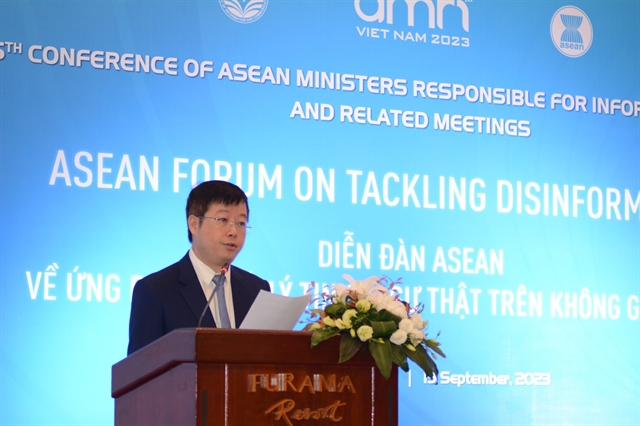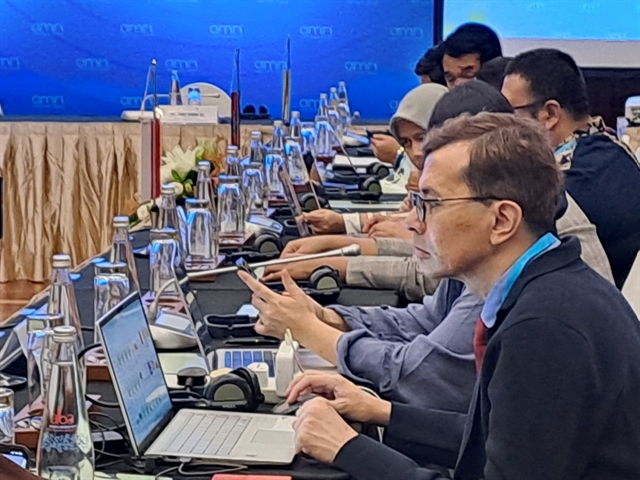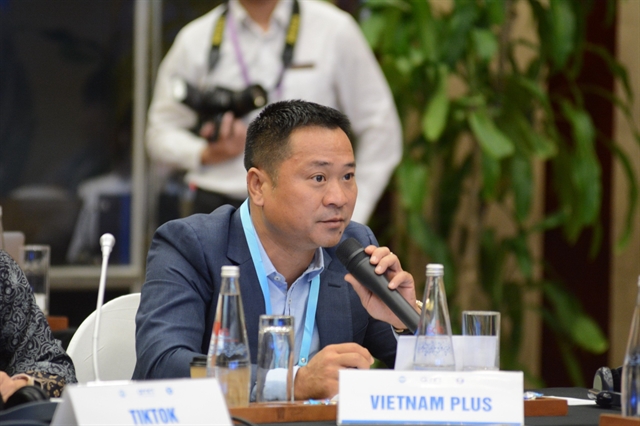 Politics & Law
Politics & Law

 |
| Deputy Minister of Information and Communications, Nguyễn Thanh Lâm addresses the ASEAN Forum in Đà Nẵng City. — Photo courtesy of Võ Văn Dũng |
ĐÀ NẴNG — Participants from ASEAN countries began sharing opinions and experiences on tackling fake news and disinformation, setting it as a regional and global danger that needs closer cooperation among member states and technological platform companies as well as internet users.
Fake news and disinformation could hit society, the economy and political platforms, and it needs to be curbed to minimise the impact on the public, the forum was told yesterday.
The forum on fake news and disinformation precludes the 16th Conference of ASEAN Ministers Responsive for Information and related Meetings (AMRI) in the central city of Đà Nẵng on September 20-23.
Izzad Zalman, a senior officer of the ASEAN secretariat said: “ASEAN needs guidelines in combating fake news and disinformation in the media for the government officers as it provides a framework for government information officers in collaboration with media organisations, journalists, and other stakeholders to identify and prevent the spread of false information.
“These guidelines typically aim to promote ethical journalism practices, fast-checking, and transparency in reporting. It also helps to ensure that accurate and reliable information is disseminated to the public.
“Establishing common standards and best practices recognised by media organisations and other stakeholders could provide the way of verifying sources, distinguishing between the fact and opinion, avoiding sensationalism and reporting on controversial issues in a balanced and fair manner."
He also discussed responses to combat fake news and disinformation including fast-checking the information; identifying the source; providing accurate information; using clear and concise language; addressing the impact; using social media; being persistent and not amplifying the fake news or disinformation.
Deputy Minister of Information and Communications, Nguyễn Thanh Lâm, said: "ASEAN has proceeded with many activities to increase awareness of tackling the harmful effects of fake news since 2017.
 |
| Participants from member countries of ASEAN join a forum on tackling fake news and disinformation. — VNS Photo Công Thành |
“Continuous programmes and workshops on fake news and disinformation prevention have been held to share management policies and improve digital literacy for citizens and electronic information management agencies.
“It was an outstanding milestone when the Framework and Joint Declaration on Reducing the Harm Effects of Fake News was approved in 2018 by the 14th Conference of ASEAN Ministers Responsive for Information (AMRI) and related meetings. The 19th ASEAN Senior Officials Responsible for Information (SOMRI) Meeting in 2022 approved the initiative proposed by Việt Nam to establish an ASEAN Task Force on Fake News.”
The ASEAN framework and mechanism have provided a platform for ASEAN member countries to enhance cooperation, share information, and propose feasible solutions to solve the problem in the region, he added.
Nguyễn Thanh Lâm, a representative of TikTok in Việt Nam said the technological platform has been cooperating with Key Opinion Leaders (KOLs) in Việt Nam posting identified swindling cases on social networks.
He said it would help social network users easily detect possible fraudulent information by cross-checking key reports from KOLs and reliable sources.
Dimas Aditya Nugraha from Indonesia shared ways to detect fake news and disinformation including checking the source; the author’s credibility; and other sources.
 |
| Trần Ngọc Long, from VietnamPlus.vn, an online newspaper of Vietnam News Agency, at the ASEAN Forum on tackling fake news. — Photo courtesy of Võ Dũng |
He said checks should be made to verify if things are a joke and if images that people see on social media could have been edited or manipulated.
Fake news relies on believers reposting, retweeting, or otherwise sharing false information, so it needs to use a fast-checking site or system, he added.
Trần Ngọc Long, from VietnamPlus.vn, an online newspaper of Việt Nam News Agency, shared experiences on combating fake news.
He said the spread of fake news globally shows the press needs to connect with readers and audiences more effectively, while fake news has attracted more attention than official news.
Long said: “The TikTok account Factcheckvn, a fact-checking channel launched by the Vietnam News Agency (VNA) on TikTok in 2020 is part of the VNA’s fake news project named ‘The fight against fake news - Creative ideas and Effective solutions.
“We have close cooperation with the Ministry of Public Security, the Ministry of Information and Communications and some other ministries in Việt Nam. Once we get any rumours, our reporters will check the news sources and disseminate accurate information to alert readers and audiences.
“We combine crowd and audiences (especially the Generation Z audiences) to detect false news on social media. Any TikTok or Facebook users could tag @Factcheckvn or Vietnamplus if they think any suspicious news on social media platforms so that our reporters could detect fake news and publish accurate information in the form of interviewing experts or relevant authorities.”
For VietnamPlus - the official online newspaper of Vietnam News Agency - detecting fake news is a multi-step procedure that entails analysing the content of the news to assess its trustworthiness, he explained.
Long added: “TikTok Factcheckvn is Vietnam News Agency’s Gateway to Generation Z. Up to now, we have 2.68 million followers and 1.5 million likes. Our project has good feedback from many readers and audiences.”
The 16th AMRI will continue with SOMRI meetings and forums on digital transformation for media – creativity and innovation–knowledge. — VNS




